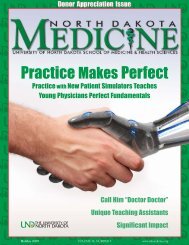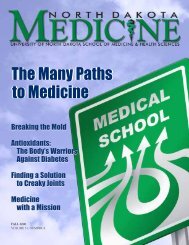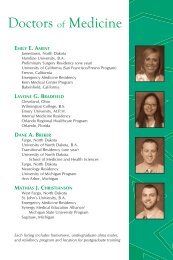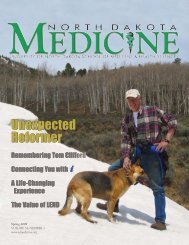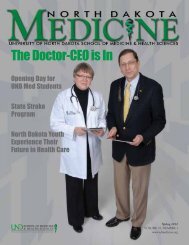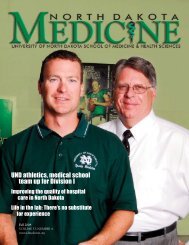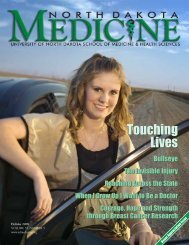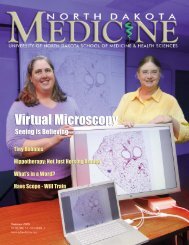View PDF - North Dakota Medicine
View PDF - North Dakota Medicine
View PDF - North Dakota Medicine
- No tags were found...
You also want an ePaper? Increase the reach of your titles
YUMPU automatically turns print PDFs into web optimized ePapers that Google loves.
NEWS BRIEFS<br />
Your grandchildren are what you eat<br />
Your overeating or cigarette smoking today might have an effect<br />
on not only you but also your grandchildren. Trying to<br />
understand the potential links between environmental<br />
exposures to various chemicals and the development of human<br />
diseases later in life is the focus of an effort by University of<br />
<strong>North</strong> <strong>Dakota</strong> biomedical researchers who have received a fiveyear,<br />
$1.5 million grant from the National Institutes of Health,<br />
which is the nation’s medical research center and is the largest<br />
source of funding for medical research in the world.<br />
Assistant Professor Joyce Ohm, PhD, in the Department of<br />
Biochemistry and Molecular Biology at the UND School of<br />
<strong>Medicine</strong> and Health Sciences is the principal investigator for<br />
the research project. She will lead a collaborative endeavor that<br />
draws on the expertise of scientists from throughout the SMHS.<br />
During the project, titled “Environmental toxins and stem cell<br />
epigenetic/epigenomic remodeling,” UND biomedical researchers<br />
will study how the epigenome, the biochemical elements in the<br />
cellular neighborhood around DNA, may direct the expression<br />
of the genetic code for good or for ill and how epigenetic<br />
changes to DNA may be passed to offspring and their children.<br />
DNA was once thought to hold one’s destiny chiseled in<br />
stone, the sole determinant of who you are or will be. However,<br />
scientists have recently found that DNA is text that is editable by<br />
the epigenome, and this fluidity plays a pivotal role in whether<br />
one develops a disease based on the effect of exposure to toxins<br />
and if one might pass this susceptibility to future generations.<br />
“Abnormal epigenetic regulation has been implicated in a<br />
variety of human diseases,” Ohm said. “Those diseases include<br />
cancer, obesity, diabetes, infertility, and<br />
neurodegenerative disorders such as<br />
Alzheimer’s disease or Parkinson’s<br />
disease.” In 2009, Ohm completed a<br />
postdoctoral fellowship in oncology<br />
with an emphasis in cancer and stem<br />
cell epigenetics at the Johns Hopkins<br />
University School of <strong>Medicine</strong>.<br />
UND scientists will use two types<br />
of adult stem cells to study how Joyce Ohm<br />
environmental toxins affect your<br />
epigenome: The first are induced pluripotent stem cells, or<br />
iPSCs, adult stem cells whose calendars have been turned back<br />
by scientists to their pluripotent state, meaning the cells are not<br />
limited as to the type of cell they can become. The second are<br />
mesenchymal stem cells, which are derived from the bone<br />
marrow of adults.<br />
Working with Ohm will be Professor Brij Singh, PhD;<br />
Associate Professor John Shabb, PhD, from the Department of<br />
Biochemistry and Molecular Biology; and Associate Professor John<br />
Watt, PhD, from the Department of Anatomy and Cell Biology.<br />
Because analysis of the data for the human epigenome dwarfs<br />
the effort that took place to map the human genome, they will<br />
rely on Assistant Professor Kurt Zhang, PhD, in the Department<br />
of Pathology, an expert in bioinformatics, the interdisciplinary<br />
field that uses the power of computers and statistics to analyze<br />
the wealth of information generated by the research.<br />
10th Annual American Indian Health Research Conference:<br />
Indigenous Research Across the Lifespan<br />
The 10th Annual American Indian Health Research Conference<br />
took place on October 19 at the Alerus Center in Grand Forks.<br />
The conference offered opportunities to discuss research<br />
directions, partnerships, and collaboration in health research<br />
focusing on American Indians. The conference featured Diane J.<br />
Willis, PhD, professor emeritus of pediatrics and medical<br />
psychology in the Department of Pediatrics at the University of<br />
Oklahoma Health Sciences Center, who provided the conference’s<br />
keynote address titled “Futility, Timidity, Stagnation, or<br />
Comfort: Making Research Fun, Meaningful and Relevant.”<br />
Willis devoted much of her career to developing programs<br />
for children with developmental disabilities and advocating for<br />
services for child victims of abuse and neglect. At the Oklahoma<br />
Health Sciences Center, she was instrumental in establishing<br />
clinical programs and clinics to help developmentally disabled<br />
or abused children.<br />
She has written and taught extensively at a national level,<br />
helped to encourage better research on mental health services<br />
for American Indians, and has testified before the U.S. Congress<br />
on several occasions about the mental health needs of American<br />
Indians. She was named Indian Woman of the Year by the<br />
Oklahoma Federation of Indian Women in 2000. She is an<br />
enrolled member of the Kiowa Tribe.<br />
Numerous posters and exhibits were on display at the<br />
conference along with sessions that focused on health risk and<br />
health promotion among Native American communities.<br />
The 10th Annual American Indian Health Research<br />
Conference was sponsored by the <strong>North</strong> <strong>Dakota</strong> IDeA<br />
(Institutional Development Award) Network of Biomedical<br />
Research Excellence, UND Center for Rural Health, UND Seven<br />
Generations Center of Excellence in Native Behavioral Health,<br />
and the UND Chapter of the Society of Indian Psychologists.<br />
6 NORTH DAKOTA MEDICINE Holiday 2012



